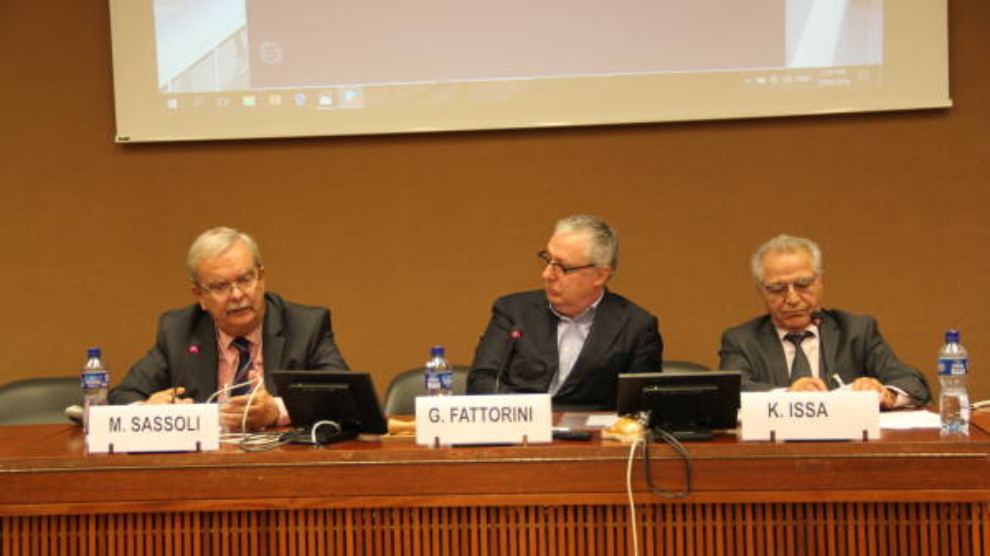UN panel on ISIS: International forces should take responsibility
In the UN conference on ISIS, academics called on the international forces to take responsibility for the trial of ISIS mercenaries.
In the UN conference on ISIS, academics called on the international forces to take responsibility for the trial of ISIS mercenaries.

The 42th Human Rights Sessions of the UN Human Rights Council, which began at the United Nations Office in Geneva on 9 September, continues with discussions on human rights violations in various countries.
In parallel to the session, non-governmental and civil society organizations in the UN Geneva office also hold conferences and panels on specific issues.
A conference on the situation of ISIS members and their families held in the territory of North East Syria under SDF supervision was organised by MRAP (Mouvement contre le Racisme et pour l’Amitié entre les Peuples) in collaboration with the Geneva Academy.
Speakers were: Prof. Marco Sassoli, Director, Geneva Academy of International Humanitarian Law and Human Rights; Prof. Agnes Calamard, UN Special Rapporteur on extrajudicial, summary or arbitrary executions; Dr. Khaled Issa, Representative of the Northern Syria Administration in France.
The panel was moderated by Mr. Gianfranco Fattorini,Former Co-president of the Mouvement contre le Racisme et pour l’Amitié entre les Peuples (MRAP).
Prof. Marco Sassoli began his speech by saying that the situation of ISIS members and their families in North East Syria is a legal issue as well as a humanitarian one.
Sassoli stated that there are legal gaps in the trial of ISIS mercenaries and added: "The status of Rojava is not accepted internationally and this forces the establishment of a court here. Unfortunately international law is built on nation-states. In order to establish an international court, the Syrian regime must allow this."
Speaking of the difficulties of establishing an international court in a military region, Sassoli said: “The Geneva Convention provides for an international court under the supervision of a military group under war crimes, but there are legal gaps. These legal gaps can be overcome if international forces agree on the same kind of trial. The important thing is to try these people as war criminals, not as a terrorist group. ”
Western states can establish a common court within the framework of universal law by using their national laws and judge the ISIS members who are their own citizens, Sassoli said.
“If Western powers want it, they can set up this court in any western country, for example in Switzerland, but there is an obstacle to this since international law is based on the place where the crime was committed", he added.
Following Sassoli was North-East Syria (Rojava) Representative of France Xalıt Isa said: “Yes, a distinction can be made between some of the women of ISIS, but let us not forget that these women did not go to that land to bring roses. We don't look at anyone as guilty from the beginning, we have laws, and this is basically a legal process. First of all, no one should forget that the Kurds fought a great fight against ISIS. We lost thousands of young people, women and children in this war."
Isa criticized the fact that international forces still refrain from doing their duty to try ISIS mercenarie. "International laws - he said - are also very clear on the definition of terrorism or the definition of war crimes. On this basis, we want the Western powers to help us with how to judge their own people involved in this crime. These people have committed crimes in those lands, they should be tried in those lands. We have asked many states to take their citizens, but they have so far refused to do so. Therefore we say that we will establish an international court in our land and try these people there."
Isa said that the establishment of an international court in the region is not as impossible as it was said, and underlined that a court could be established upon the request of the UN Security Council and international forces. "Our priority is to try ISIS mercenaries on the territory where they commit crimes, - said Isa - we call on international forces and institutions to take responsibility on this point."
Agnes Callamard, UN Special Rapporteur on extrajudicial, summary or arbitrary executions, attended the conference via video-conference, said that the trial of ISIS members should be done on the right basis and that the demands of the victims should be taken into consideration.
"The international community and institutions should not avoid their responsibilities. - said Collamard - The trial, however, must be based on the fact that this crimes were realized without discrimination between the victims. The trial should be carried out in a way that takes into account the demands of all victims."